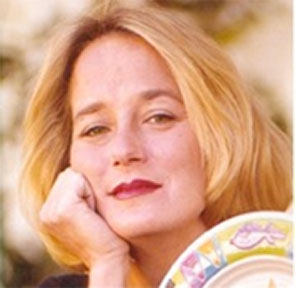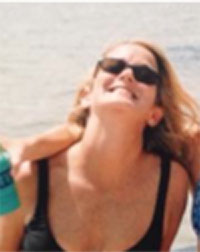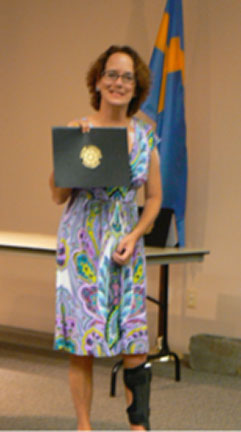Don’t Forget to Eat Dessert First:
Four Remembrances of Poet Shannon Smith (RWW 2010)
By Christine Robbins (2012), Eric Gnezda (2009), Greg Glazner, and Stan Rubin.

Shannon Smith, 1966-2014
Shannon and I first bonded over cigarettes at the summer RWW residency in 2010. I’d heard about her—she suffered brain cancer and a stroke, yet here she was—this beautiful young woman with a cane, coming back for a graduate residency a year later than her class. She’d flown from Birmingham to Washington State alone, and I thought she was simply fierce.
She was direct about her illness—it sucked. She called me Boo, and, wow, was she funny. We had long talks over the years. She didn’t shield herself with humor; she was comfortable talking about pain, but our talks would take a turn I could neither predict, nor put in print. She’d have me laughing like a twelve-year-old girl over her irreverent one-liners. She was smart, deep, authentic and funny. What could be better?
Shannon had worked for FEMA—and she’s a person I’d want around in a disaster. I know that she understood suffering before she was hit with so much of it herself. In her thesis, Shannon quotes Samantha Power as a challenge to poets: “How can you sit behind a desk in an office when there is so much work to be done in the world?” For Shannon, compassion and action were inseparable.
I can’t find meaning in the pain she endured. It’s especially hard to think about her feeling trapped inside her gorgeous self, when anyone else’s suffering would call her to act. I don’t think the human body was designed to endure the physical pain she went through, and brain cancer is especially hard to reconcile; suffering was within the very structure of her mind. We talk about strength as survival, though of course we don’t ultimately survive. Another kind of strength is dying well, whatever that might mean. Shannon died the way she lived; she kept her compassion, her joy, even her wild sense of humor, right up to the end. As her friend, I find solace in that particular strength.
—Christine Robbins
Olympia, Washington
LOOKING FOR WHAT IS LEFT
The darkness is back,
hovering over this crumpled body
where waves of pain call home.
The blackness has become opaque now
Not even outlines of the everyday.
Morphine, Fetanyl, Sekanol- hello lovers.
I hide as I swallow nails.
The shutters bang against windows.
It is too late for prayer.
Lightning cracks the night sky
shattering my skull
on the zipper of scars,
one stitch at a time.
Sleep will never find me here.
The warden of pain shakes his keys
at my cage. These are not the tears of heartbreak-
much too salty, much too free.
This darkness is heavy and suffocating
like a fishing net with weights.
If I am here tomorrow,
I will go look for myself
kicking bones out of the way,
to see what is left
_______________________Shannon Smith
__(reprinted from 9th Street Laboratories website)
* * *
A Southern accent lends itself to candor. But add Shannon’s wry sense of humor, cushioned with kindness, and it was no wonder that so many of us were drawn to her from the start.
I met her at orientation, her arm bandaged and in a sling. Something about her demeanor invited me to blow past protocol. So I walked up to her, and, without introducing myself, cut right to the chase.
“What did you do to your arm?” I asked.
I don’t remember her medical explanation, but I will never forget the ease with which she responded, detailing her diagnosis and opening up about herself, her job at FEMA, and her life.
Immediate trust.
Perhaps because of her constant pain, or an intuitive awareness that her time was short, she sought truth and authenticity, often dismissing pretentiousness with an aside. Her humor penetrated, yet was laced with empathy—an empathy that reminded us that acceptance is most likely to find us when we remain true to our own voices.
—Eric Gnezda
Worthington, Ohio
WILD PUMPKINS
Who knew there were such things?
Not Halloween, round orange pumpkins,
But pumpkins that grow from their own
Volition,
Without help from our poor
Human hands.
They grow at your island house,
Far and deep in the Caribbean
Away from traffic
And the salt air.
You send me to the yard
To find one so you can
make wild pumpkin soup.
You think I am searching
But, really, I’m looking
For my heart.
I think I left it here in my carelessness.
Finally, in the southwest corner
Of the yard I find it:
Its face turned toward the tropical sun.
I rub my fingers over
Its green skin and
Think this must be my
Heart, and, if not mine,
Then yours.
________________Shannon Smith
* * *
Shannon had more courage and spark than most of us could hope to have. While in serious, debilitating pain, she completed assignments, wrote good poems, corresponded, and finished an MFA.
She a lso loved to laugh. During my first residency, I sometimes sat at her table during meals, and several of us made a habit of getting dessert when we got our entrees, often eating the sugary stuff first. In subsequent years, as I corresponded with her, Shannon would usually end an email in which she’d reported major health issues with, “Don’t forget to eat dessert first.”
lso loved to laugh. During my first residency, I sometimes sat at her table during meals, and several of us made a habit of getting dessert when we got our entrees, often eating the sugary stuff first. In subsequent years, as I corresponded with her, Shannon would usually end an email in which she’d reported major health issues with, “Don’t forget to eat dessert first.”
Never assuming she was the only one struggling, she routinely asked me about my injuries, as if the back and shoulder ailments I was having could somehow deserve mention next to hers. She loved writing and living and refused to let even suffering, even a seriously shortened lifespan, stop her from pursuing them.
—Greg Glazner
Faculty Mentor
* * *
Shannon stands out as one of the most compelling and appealing people I’ve worked with in a long career. Certainly, she was one of the bravest. From the time I first recruited her on the phone, following her work for FEMA after Hurricane Katrina, I knew she was an original. Her mind was not anyone else’s mind; her voice was hers alone. She was always coming to you “live,” in her wonderful sharp poems and in her sassy, smart conversation, which wasn’t only about herself, but engaged her values, her communities, the many  things and people she passionately cared about. It was filled with appreciation of family, friends, poetry, art, and all who struggle to make the world better. Her commitment and caring made you believe the world can be better.When we spoke on the phone I often wished I could write down and preserve the word pictures and phrases that flew like sparks. She didn’t spare herself despite the extended horror she lived. She made you laugh at what wasn’t truly funny and laughed with you. This is more than a form of endurance; it is a rare human spirit, joyously shining.
things and people she passionately cared about. It was filled with appreciation of family, friends, poetry, art, and all who struggle to make the world better. Her commitment and caring made you believe the world can be better.When we spoke on the phone I often wished I could write down and preserve the word pictures and phrases that flew like sparks. She didn’t spare herself despite the extended horror she lived. She made you laugh at what wasn’t truly funny and laughed with you. This is more than a form of endurance; it is a rare human spirit, joyously shining.
I am grateful to have been her friend as well as her thesis advisor. She held herself to high standards. When her health forced her to withdraw from our program for a time, she managed, through pain, to produce work to make up what she missed, and when she rejoined us, she insisted that she would not accept the degree on any basis but earning it like everyone else. And she put me on notice that she would, without question, earn it. She earned much more. She earned our respect, admiration, and love.
—Stan Rubin, Founding Director, RWW
TWELVE BLANKETS FOR MY BRAIN
After the surgeons have
rearranged my head,
they become concerned
about my body temperature
at eighty six degrees. It is strange,
because I do not feel cold, only empty.
Nurses bring one blanket after another
wrapping me up tightly. I feel warm
but trapped and weighted down like
swimming with my clothes and shoes on.
Two more blankets
added to the pile-
Now I am just tangled like
A fish in a fishing net not knowing which way is up
or out. My voice trapped under layers of thick cotton.
And when I reach the numeric definition of normal, I do
not feel different or normal, mostly just trapped.
Tucked in, but no bedtime story.
I picture myself escaping from the hospital;
sliding in my socks on the shiny floors,
running down the halls,
riding elevators,
waving to other patients.
My blankets alone in a pile on the floor.
____________________________Shannon Smith
______(reprinted from 9th Street Laboratories website)
Top photo courtesy of Mobile Press Register.
Middle photo courtesy of Joan Doster Smith
RWW Graduation photo by Holly Hughes
Poetry by Shannon Smith by permission, Joan Doster Smith
_
